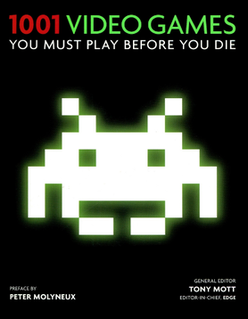 W
W1001 Video Games You Must Play Before You Die is a video game reference book first published in October 2010. It consists of a list of video games released between 1970 and 2013, arranged chronologically by release date. Each entry in the list is accompanied by a short essay written by a video game critic, with some entries accompanied by screen shots. It was edited by Tony Mott, longtime editor of Edge magazine. The book's preface was written by video game designer Peter Molyneux.
 W
WThe Art of Computer Game Design by Chris Crawford is the first book devoted to the theory of computer and video games. The book attempts to categorize computer games and talks about design precepts that serve as guidelines for game designers. It was originally published in Berkeley, California by McGraw-Hill/Osborne Media in 1984. The original edition is now out-of-print but from 1997 became available as a free download from a site maintained by Washington State University, Pullman. In 2011 the free download was removed and the text is currently available as a Kindle e-book.
 W
WThe Atari video game burial was a mass burial of unsold video game cartridges, consoles, and computers in a New Mexico landfill site, undertaken by American video game and home computer company Atari, Inc. in 1983. Up until 2014, the goods buried were rumored to be unsold copies of E.T. the Extra-Terrestrial, one of the biggest commercial failures in video gaming and often cited as one of the worst video games ever released, along with the Atari 2600 port of Pac-Man, which was commercially successful but critically maligned.
 W
WIn computing, an avatar is a graphical representation of a user or the user's character or persona. It may take either a two-dimensional form as an icon in Internet forums and other online communities or a three-dimensional form, as in games or virtual worlds. Avatar images have also been referred to as "picons" in the past, though the usage of this term is uncommon now. An avatar can also refer to a text construct found on early systems such as MUDs. The term "avatar" can also refer to the personality connected with the screen name, or handle, of an Internet user.
 W
WThe Bartle taxonomy of player types is a classification of video game players (gamers) based on a 1996 paper by Richard Bartle according to their preferred actions within the game. The classification originally described players of multiplayer online games, though now it also refers to players of single-player video games.
 W
WBushnell's Law or Nolan's Law is an aphorism often attributed to Atari founder Nolan Bushnell, on the subject of video game design:All the best games are easy to learn and difficult to master. They should reward the first quarter and the hundredth.
 W
WChiptune, also known as chip music or 8-bit music, is a style of synthesized electronic music made using the programmable sound generator (PSG) sound chips or synthesizers in vintage arcade machines, computers and video game consoles. The term is commonly used to refer to tracker format music which intentionally sounds similar to older PSG-created music, as well as music that combines PSG sounds with modern musical styles. It has been described as "an interpretation of many genres" since any existing song can be arranged in a chiptune style defined more by choice of instrument and timbre than specific style elements.
 W
WChris Crawford on Game Design (ISBN 0-13-146099-4) is a book about computer and video game design by Chris Crawford. Although referred to as the second edition of The Art of Computer Game Design, it is in fact a completely new book. It was published by Peachpit under the New Riders imprint in 2003. It includes Crawford's response to recent game developments, such as The Sims, and dedicates a chapter to each of his first 14 published games: Tanktics, Legionnaire, Wizard, Energy Czar, Scram, Eastern Front (1941), Gossip, Excalibur, Balance of Power, Patton Versus Rommel, Siboot, The Global Dilemma: Guns & Butter, Balance of the Planet and Patton Strikes Back.
 W
WCybernet was a weekly video gaming magazine programme, originally broadcast overnight on the ITV network in the United Kingdom. The programme was commissioned by Yorkshire Television and produced by Capricorn Programmes and also aired on GBC TV in Gibraltar. It was also broadcast on various television stations all around the world.
 W
WDon't Copy That Floppy was an anti-copyright infringement campaign run by the Software Publishers Association (SPA) beginning in 1992.
 W
WAn eggplant run is a challenge playthrough of the 2012 roguelike-like platform video game Spelunky HD. Such a playthrough centers on carrying an eggplant item to the final boss of the game, King Yama, and tossing it into his face. This eggplant item was originally added to Spelunky as part of an easter egg pitched by the game's composer Eirik Suhrke, and Spelunky's lead designer Derek Yu decided to give it the additional function of turning King Yama into an inert eggplant monster.
 W
WEsports is a form of competition using video games. Esports often takes the form of organized, multiplayer video game competitions, particularly between professional players, individually or as teams. Although organized competitions have long been a part of video game culture, these were largely between amateurs until the late 2000s, when participation by professional gamers and spectatorship in these events through live streaming saw a large surge in popularity. By the 2010s, esports was a significant factor in the video game industry, with many game developers actively designing and providing funding for tournaments and other events.
 W
WThe Freeplay Independent Games Festival is Australia's longest-running and largest independent games festival, first established in 2004. The Festival celebrates fringe artists and game makers, and highlights grassroots developers and art games. It gathers artists, designers, programmers, writers, gamers, creators, games critics, games academics and students to celebrate the art form of independent games and the culture around them.
 W
WFrom Bedrooms to Billions is a 2014 documentary film by British filmmakers Anthony and Nicola Caulfield that tells the story of the British video games industry from 1979 to the present day. The film focuses on how the creativity and vision of a relatively small number of individuals allowed the UK to play a key, pioneering role in the shaping of the billion dollar video games industry which today dominates the modern world's entertainment landscape. The film features interviews with major British game designers, journalists and musicians from across the last 30 years.
 W
WG4 is an American pay television network originally owned by G4 Media, a joint venture between the NBCUniversal Cable division of NBCUniversal and Dish Network. The network originally launched on April 24, 2002, and was primarily focused on video games and gaming culture.
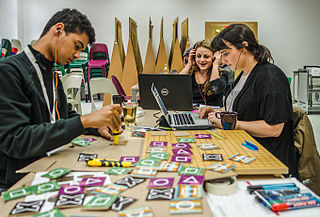 W
WA game jam is a contest where participants try to make a video game from scratch. Depending on the format, participants might work independently, or in teams. The contest duration usually ranges from 24 to 72 hours. Participants are generally programmers, game designers, artists, writers, and others in game development-related fields.
 W
W"Game over" is a message in video games which signals to the player that the game has ended. It is usually received negatively in a situation where continued play is disallowed, such as losing all of one's lives or failing a critical objective. However, it sometimes also appears after the successful completion of a game, usually ones designed for arcades. The phrase has since been turned into quasi-slang, usually describing an event that will cause significant harm, injury, bad luck, or even death to a person.
 W
WA gamemaster is a person who acts as an organizer, officiant for regarding rules, arbitrator, and moderator for a multiplayer role-playing game. They are more common in co-operative games in which players work together than in competitive games in which players oppose each other. The act performed by a gamemaster is sometimes referred to as "Gamemastering" or simply "GM-ing".
 W
WGamers Outreach Foundation was founded in 2007 and is a 501(c)(3) nonprofit organization that provides equipment, technology, and software to help kids cope with treatment inside hospitals. The organization aims to inspire and heal patients through the power of interactive play.
 W
WThe Games, Learning & Society academic conference, or GLS conference, was an annual gathering of academic researchers, video game developers, and government and industry leaders in Madison, Wisconsin, to discuss the social significance of gaming culture. Specifically, they examined how games can be used to transform how people learn and what implications that knowledge has for society. According to the official website, the conference's stated mission was to foster substantive discussion and collaboration among academics, designers, and educators interested in how videogames - commercial games and others—can enhance learning, culture, and education. The founder and chair was Constance Steinkuehler. The first conference was held in 2005, and took place at the Monona Terrace, a conference center inspired by the design of Wisconsin architect Frank Lloyd Wright. The final conference was held in 2016, where Constance Steinkuehler announced she was leaving the University of Wisconsin–Madison, and that the GLS conference would not continue in her absence. A similar conference, Play Make Learn Conference, meant to continue the work and is also held annually at University of Wisconsin–Madison.
 W
WGaymer and gay gamer are umbrella terms used to refer to the group of people who are identified as homosexual and have an active interest in video games or tabletop games, also known as gamers. Lesbian, bisexual, and transgender gamers are often categorized under this term.
 W
WGinx TV, officially GINX Esports TV, is a United Kingdom-based television channel dedicated to Esports that originally launched in August 2008.
 W
WGoozex was an online trading community established in July 2006 which allowed people to trade video games and movies in the United States, Canada and Bermuda. The name Goozex came from a shortened version of "Goods Exchanged." Goozex used an internal point system as currency and worked as a middleman matching buyers and traders instead of handling the actual movies and games. In November 2007, Goozex was ranked as the best website for trading games online by video game magazine Electronic Gaming Monthly and GamesRadar.com. It has since received a ranking of F from the Better Business Bureau. Goozex traded games for the Atari 2600, Xbox, Xbox 360, NES, Super NES, Nintendo 64, GameCube, Wii, Game Boy, Game Boy Color, Game Boy Advance, Nintendo DS, PlayStation, PlayStation 2, PlayStation 3, PSP, PS Vita, Sega Genesis, Sega CD, Dreamcast, PC, and Macintosh, along with movies in DVD, Blu-ray, HD DVD, and UMD formats.
 W
WGuitar Hero is a series of rhythm video games published by Activision in which players use guitar-shaped controllers to mimic the playing of numerous popular rock music songs in a score attack gameplay; later games in the series have included support for both drums and vocals and playing as a full band. With over $2 billion in total sales worldwide, the game series has made a significant cultural impact, becoming a "cultural phenomenon" and recognizable in the popular culture. The series has been found to influence younger players into learning real instruments and has found application within the health care industry to help recovering patients.
 W
WThe HYDRA Game Development Kit is the latest creation of Andre LaMothe similar to the XGameStation. Like the XGameStation, HYDRA is an open system, allowing anyone to create games for it. However, being less focused on teaching electronics and more about homebrew games, the HYDRA uses a more complex and powerful CPU - the recently released Parallax Propeller processing unit, which has eight 32 bit RISC CPUs called cogs with 32 KB built in RAM and 32 KB built in ROM.
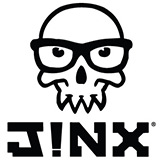 W
WJinx, stylized as J!NX, is a San Diego, California-based clothing line started by Sean Gailey and Tim Norris in 1999 that creates video game -themed apparel.
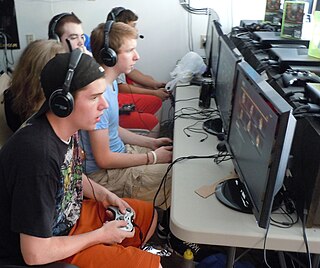 W
WA LAN Gaming Center is a business where one can use a computer connected over a LAN to other computers, primarily for the purpose of playing multiplayer computer games. Use of these computers or game consoles costs a fee, usually per hour or minute; sometimes one can have unmetered access with a pass for a day or month, etc. It may or may not serve as a regular café as well, with food and drinks being served. Many game centers have evolved in recent years to also include console gaming (Xbox, GameCube, PlayStation 2). Other centers offer computer repair and consulting, custom built computers, web design, programming classes or summer camps, and many other technology related services. Centers are starting to offer PS3s, Wiis and Xbox 360s that are playable in store.
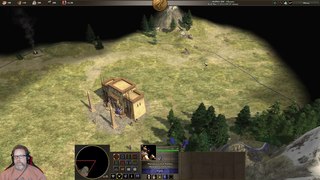 W
WA Let's Play (LP) is a video documenting the playthrough of a video game, usually including commentary or a camera view of the gamer's face. A Let's Play differs from a video game walkthrough or strategy guide by focusing on an individual's subjective experience with the game, often with humorous, irreverent, or critical commentary from the gamer, rather than being an objective source of information on how to progress through the game. While Let's Plays and live streaming of game playthroughs are related, Let's Plays tend to be curated experiences that include editing and narration, can be scripted, while streaming is an unedited experience performed on the fly.
 W
WIn video games, loot is the items picked up by the player character that increase their power or abilities, such as currency, spells, equipment and weapons. Loot is meant to reward the player for progressing in the game, and can be of superior quality to items that can be purchased. It can also be part of an upgrade system that permanently increases the player's abilities.
 W
WLucky Wander Boy is the 2003 debut novel by D. B. Weiss. The book's official website describes the work as: "A novel of video game addiction, Hollywood serfdom, ill-fated romance and extremely misguided notions about Japan, Lucky Wander Boy marks the debut of an original new voice that will captivate wanderers of every description."
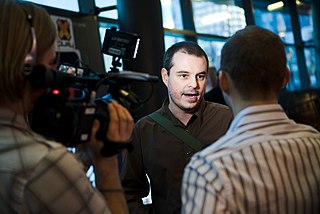 W
WLudonarrative dissonance is the conflict between a video game's narrative told through the story and the narrative told through the gameplay. Ludonarrative, a compound of ludology and narrative, refers to the intersection in a video game of ludic elements (gameplay) and narrative elements. The term was coined by game designer Clint Hocking in 2007 in a blog post.
 W
WMachinima, Inc. was an American multiplatform online entertainment network owned by WarnerMedia. The company was founded in January 2000 by Hugh Hancock and was headquartered in Los Angeles, California.
 W
WIn games and digital media, the "magic circle" is the space in which the normal rules and reality of the world are suspended and replaced by the artificial reality of a game world. As noted by Edward Castronova in Synthetic Worlds: The Business and Culture of Online Games, the boundary delineating this space "can be considered a shield of sorts, protecting the fantasy world from the outside world". Instead of being impenetrable, however, an examination of contemporary virtual worlds reveals that the magic circle is actually quite porous. More directly, there appears to be a relationship between virtual worlds and the outside world. Even though virtual worlds display a range of attributes that are unique to their realm, they also exhibit characteristics deriving from the outside world. Castronova uses the term "synthetic world" because a synthetic world "cannot be sealed completely; people are crossing it all the time in both directions, carrying their behavioral assumptions and attitudes with them". As this suggests, elements of synthetic worlds are being evaluated in terms of their importance in the outside world. These newly established values, subsequently, gain significance on both sides of the membrane. Thus, it becomes difficult to determine the meaning of the word "virtual". As stated by Castronova, the "allegedly 'virtual' is blending so smoothly into the allegedly 'real' as to make the distinction increasingly difficult to see".
 W
WMajor League Gaming Corp. (MLG) is a professional esports organization. MLG is headquartered in New York City, New York and was founded in 2002 by Sundance DiGiovanni and Mike Sepso. MLG has held official video game tournaments throughout the United States and Canada. The Boost Mobile MLG Pro Circuit was a television broadcast of Halo 2 MLG tournaments in 2006 and 2007, ESPN.com, and other broadband sites. The company has also been involved in television production, and game development. MLG's aim is to elevate computer and console game tournaments to viable competitive and spectator events.
 W
WMana Bar was the first Australian cocktail bar and video gaming lounge located in Brisbane, Australia within its biggest night-life and entertainment district, Fortitude Valley. The bar held its opening event on 20 March 2010. The bar allowed visitors to play current generation gaming consoles free of charge while enjoying video game themed drinks.
 W
WMapCore is a game development community with origins in Half-Life mod production, which since its inception in 1999 has evolved into a thriving forum featuring all flavours of game development including level design, modelling, concept art, and programming. With 100+ members part of the professional games industry working for the likes of Valve Corporation, Blizzard, Crytek, DICE, Gearbox Software, Rockstar Games, and Ubisoft, MapCore offers an opportunity for professionals and amateurs alike to socialise, learn, teach, and find talent.
 W
WMeltdown is a French bar chain dedicated to video games and eSports.
The MMO Report was a humorous, video game news podcast, which originated on G4. Widely watched by gamers and the gaming industry it is hosted by Casey Schreiner. Styled in parody of the Colbert Report, it covers all the interesting and quirky news stories in the Massively multiplayer online game world.
 W
W"A Modest Video Game Proposal" is the title of an open letter sent by activist/former attorney Jack Thompson to members of the press and to Entertainment Software Association president Doug Lowenstein on October 10, 2005. He proposed that, if someone could "create, manufacture, distribute, and sell a video game in 2006" that allows players to play the scenario he has written, in which the character kills video game developers, he will donate $10,000 to the charity of former Take-Two Interactive chairman Paul Eibeler's choosing. The title of the letter alludes to Jonathan Swift's 18th-century satire essay A Modest Proposal.
 W
WModule file is a family of music file formats originating from the MOD file format on Amiga systems used in the late 1980s. Those who produce these files and listen to them form the worldwide MOD scene, a part of the demoscene subculture.
 W
WThe Nexon Computer Museum is a museum on Jeju Island, South Korea. It opened on July 27, 2013. It is known as one of the first permanent museum in Korea that is dedicated for the history of computer and video games. In 2017, the museum houses 6,900 items including personal computers, video game consoles, arcades, and software. The museum's supporters include institutions such as Computerspielemuseum Berlin and International Center for the History of Electronic Games, and IT companies such as Nexon, Softmax, Gamevil, Oculus VR, Thalmic Labs, Take-Two Interactive, Sony Computer Entertainment, etc. The principle of Nexon Co. Ltd.'s museum is to interact and communicate with a range of visitors from across boundaries, by collecting, preserving, researching, exhibiting and educating historic digital artifacts.
 W
WNintendo Quest: The Most Unofficial and Unauthorized Nintendo Documentary Ever! is a 2015 Canadian/American documentary road film directed by Rob McCallum about Jay Bartlett and his quest to acquire all 678 licensed Nintendo Entertainment System games within the span of 30 days, without purchasing any games online.
 W
WThe video game industry in mainland China currently is one of the major markets for the global industry, where more than half a billion people play video games. Revenues from China make up around 25% of nearly US$100 billion video game industry as of 2018, and since 2015 has exceeded the contribution to the global market from the United States. Because of its market size, China has been described as the "Games Industry Capital of the World" and is home to some of the largest video game companies. China has also been a major factor in the growth of esports, both in player talent and in revenue.
 W
WOpenEmu is an open-source multi-system game emulator designed for macOS. It provides a plugin interface to emulate numerous consoles' hardware, such as the Nintendo Entertainment System, Genesis, Game Boy, and many more. The architecture allows for other developers to add new cores to the base system without the need to account for specific macOS APIs.
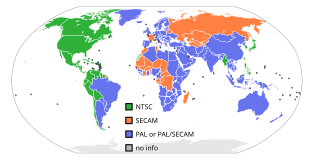 W
WThe PAL region is a television publication territory that covers most of Asia, Africa, Europe, South America and Oceania. It is so named because of the PAL television standard traditionally used in some of those regions, as opposed to the NTSC standard traditionally used in Japan and most of North America.
 W
WA PC bang is a type of LAN gaming center in South Korea, where patrons can play multiplayer computer games for an hourly fee. The typical cost for an hour of play ranges from 500 to 1500 KRW, with 1000 KRW per hour being the most common rate. Although the per capita penetration of personal computers and broadband internet access in South Korea is one of the highest in the world, PC bangs remain popular as they provide a social meeting place for gamers to play together with their peers. Aside from the social aspect, PC bangs' ability to offer access to expensive and powerful high-end personal computers, designed specifically for video gaming, at a comparatively low price has also bolstered their popularity.
 W
WThe PC Master Race, sometimes referred to by its original phrasing as the Glorious PC Gaming Master Race, is an internet subculture, internet community, and a tongue-in-cheek term of superiority for PC gaming used among gamers to compare PC gaming to console gaming.
 W
WPlayerAuctions is a digital marketplace that connects buyers and sellers of various types of gaming genre such as Massively multiplayer online game (MMO) games, First-person shooters (FPS), Multiplayer online battle arena (MOBA), Mobile game, survival games, battle royale game etc. so they can buy and sell digital assets. These include in-game currency, items, skins, accounts, power leveling and boosting services, and CD keys for games and applications. The site is a neutral marketplace that supports player-to-player trading for popular online games such as RuneScape, Old School RuneScape, World of Warcraft, CSGO, PUBG, Path of Exile, League of Legends, Fortnite, Overwatch, GTA V, Warframe, Pokémon Go, Clash of Clans, EverQuest, ArcheAge, Final Fantasy XIV, Apex Legends, Elder Scrolls Online, Habbo, and over 250 other games.
 W
WPlayr is a TV show about video gaming that aired weekly in a number of locations around the world, including the UK, Canada, South America, Spain, South Africa and across Asia. The show mixed in-depth previews, news, reviews and features on video games and is notable for its entertaining approach to the subject. Playr was executive produced by Richard Wilcox, whose credits include GamesMaster, When Games Attack and Gamer.tv.
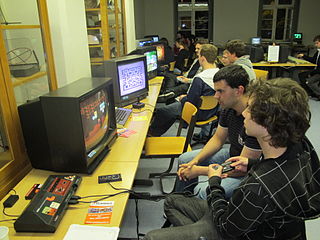 W
WRetrogaming, also known as classic gaming and old school gaming, is the playing and/or collecting of older personal computers, consoles, and/or video games, in contemporary times. Usually, retrogaming is based upon systems that are obsolete or discontinued. It is typically put into practice for the purpose of nostalgia, preservation or the need to achieve authenticity.
 W
WReviews on the Run is a video game review TV show hosted by Victor Lucas and Scott C. Jones. The show is produced by Lucas' company Greedy Productions. The two hosts rate games independently on a scale of .5 point increments from 0 through 10, with 0 being the lowest and 10 being the highest.
 W
WSmartbomb: The Quest for Art, Entertainment, and Big Bucks in the Videogame Revolution is a book written by journalists Heather Chaplin and Aaron Ruby. It was published on November 4, 2005, by Algonquin Books. It is the authors' first book and the work of five years of research.
 W
WKurt D. Squire is a Professor at The University of California, Irvine, member of the Connected Learning Laboratory, and former Director of the Games, Learning & Society Initiative at the University of Wisconsin-Madison, best known for his research into game design for education.
 W
WTeamSpeak (TS) is a proprietary voice-over-Internet Protocol (VoIP) application for audio communication between users on a chat channel, much like a telephone conference call. Users typically use headphones with a microphone. The client software connects to a TeamSpeak server of the user's choice, from which the user may join chat channels.
 W
WTerra Nova is a collaborative blog for academics and professionals in game studies. It focuses primarily on the study of virtual worlds.
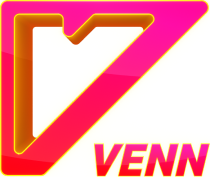 W
WVENN is an American streaming television network based in Playa Vista, California. It features gaming and pop-culture content geared towards Millennial and Generation Z audiences.
 W
WThe video game industry in mainland China currently is one of the major markets for the global industry, where more than half a billion people play video games. Revenues from China make up around 25% of nearly US$100 billion video game industry as of 2018, and since 2015 has exceeded the contribution to the global market from the United States. Because of its market size, China has been described as the "Games Industry Capital of the World" and is home to some of the largest video game companies. China has also been a major factor in the growth of esports, both in player talent and in revenue.
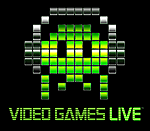 W
WVideo Games Live (VGL) is a concert series created by Tommy Tallarico and originally founded by Tallarico and Jack Wall. The concerts consist of segments of video game music performed by a live orchestra with video footage and synchronized lighting and effects, as well as several interactive segments with the audience. Incorporated in 2002, Video Games Live has performed over 420 shows internationally.
 W
WWinners Don't Use Drugs is an anti-drug slogan that was included in arcade games imported by the American Amusement Machine Association (AAMA) into North America for 11 years from 1989 to 2000. The slogan appears on a screen that is shown during a game's attract mode. The messages are credited to FBI Director William S. Sessions, whose name appears alongside the slogan.
 W
WX-Play is a former TV program about video games. The program, known for its reviews and comedy skits, aired on G4 in the United States, G4 Canada in Canada, FUEL TV in Australia, Ego in Israel, GXT in Italy, MTV Russia & Rambler TV in Russia, Solar Sports in the Philippines and Adult Swim and MuchMusic in Latin America. The show ran between July 4, 1998, and January 23, 2013.